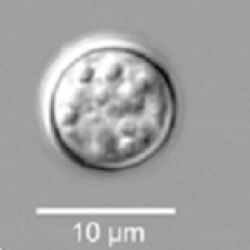E. coli. Salmonella. Campylobacter. Norovirus. When somebody gets sick eating at a restaurant, these are often the culprits. But McDonald's has been hit by an outbreak of Cyclospora. I'm a PhD microbiologist -- who has taken two classes in medical microbiology -- and I'd never heard of that. What is it?
Though it sounds rather inconceivable, the truth is that we don't know much about Cyclospora. So, here's what we do know:
Unlike the aforementioned, which are bacteria or viruses, Cyclospora is a parasite. Like many other parasites, it has a very complicated life cycle, featuring both sexual and asexual phases. Interestingly, the complexity of this microbe's particular life cycle means that the typical oral-fecal route (e.g., an employee doesn't wash his hands properly after using the restroom) is not likely to be the cause of the outbreak. There are no known instances in which Cyclospora has been transmitted directly from one person (or animal) to another.
According to the CDC, the organism is not infectious in a freshly passed stool. Instead, Cyclospora needs to spend about a week or two in the environment in order to complete its life cycle. Only then is it able to infect another human. Contaminated water and produce seem the likely culprits.
Cyclospora is a tough little bug. The textbook Medical Microbiology says it is resistant to chlorination, which is one of the pillars of our public health system. Worse, it's not easily detected by the methods we use to monitor drinking water safety, which helps explain why a microbe like this can go undetected.
The McDonald's Cyclospora Outbreak
The latest CDC data show that at least 279 people across 15 states have been affected by the McDonald's Cyclospora outbreak. (The numbers are constantly changing; other outlets have reported 286 cases, but the CDC cannot verify 7 of them.)
Salad was the cause of the outbreak. Because Cyclospora is most commonly associated with tropical and subtropical areas, it's possible that the source of the outbreak is not in the United States. McDonald's voluntarily stopped serving salads in the affected areas, so the outbreak should be coming to an end.
As it so happens, there was another very recent outbreak of Cyclospora in Del Monte vegetable trays, but it does not appear related to the outbreak at McDonald's.
What Should You Do?
Nothing, really. Foodborne outbreaks are simply a reality we live with. The CDC estimates 48 million cases of food poisoning in the U.S. each year. So, the best you can do is hope that you aren't one of the unlucky ones. Of course, you could stop eating at restaurants, but what's the fun in that?

